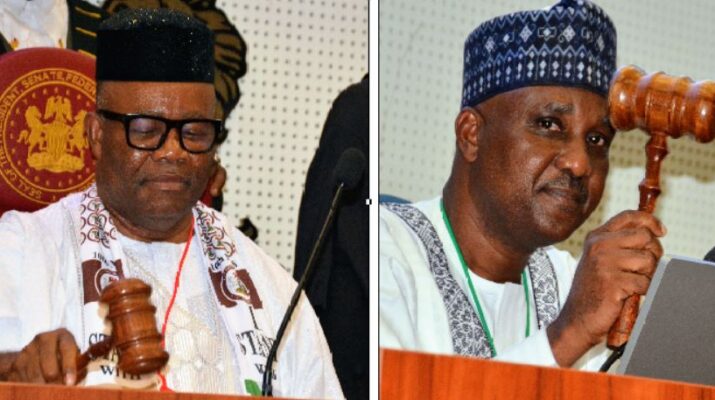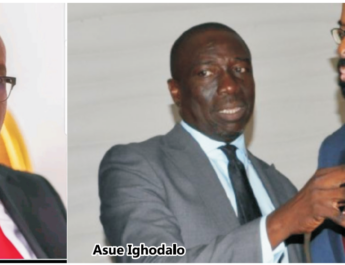Following public hearings on the review of the 1999 Constitution (as amended), some concerned Nigerians have recommended removal of defections to pave way for a robust democracy, arguing that politicians who defect from the political parties under which they contest and win elections pose a serious threat to the nation’s democracy, among other issues
By Edu Abade
If the wishes of some Nigerians are granted in the constitution review to eliminate defections (or cross carpeting) from one political party to the other is granted, governors, presidential candidates and other political office holders may face an uphill task in their quest to dump the parties under which they contested and won their various positions.
Since the democratic dispensation started in 1999, almost all Nigerian politicians have defected from one political party to the other in what they commonly refer to as alignments and realignments contrary to what obtains in the United States of America, where politicians in the two major parties-the Democrats and the Republicans-hardly switch parties due to their ideologies.
For instance, such alignments have seen former Vice President, Atiku Abubakar move from the Peoples Democratic Party (PDP) to the All Progressives Party (APC) and then back again to the PDP from where he has moved again to a new coalition named the African Democratic Congress (ADC) under which he hopes to contest the forthcoming 2027 presidential poll.
Former Governor of Anambra State and Labour Party Presidential candidate in the 2023 general elections, Peter Obi left the All Progressives Grand Alliance (APGA) under which he rose to become governor to the PDP when his tenure ended as governor. He moved again from the PDP to the Labour Party under which he contested the 2023 presidential poll. While he has been named as a member of the ADC prior to 2027, there are indications that he is being wooed back to the PDP as politicking for 2027 gathers steam.
The same goes for other politicians like President Bola Ahmed Tinubu, whose political journey saw him traverse the Alliance for Democracy (AD) to the Action Congress and now APC, as well as the incumbent President of Senate, Godswill Akpabio and other politicians in the National Assembly who have moved parties at one point or the other.
Given their penchant for defections at every election cycle, a disturbing trend emerges under President Tinubu who is bent on cajoling or coercing governors to the ruling party. Lately, Delta State Governor, Sheriff Oborevwori and his Akwa Ibom counterpart, Eno Umo joined the APC from PDP, citing alignment with the centre, while there are sustained efforts to woo suspended Rivers State Governor, Siminalayi Fubara and Bayelsa Governor, Douye Diri to the APC.
But during the public hearing on constitution review in Lagos, Executive Director of Environmental Defenders Network (EDEN), Barrister Chima Williams, in his memorandum on the proposed alteration to the provisions of the 1999 Constitution (as amended), recommended elimination of undue cross carpeting
He argued that recent experience has shown that the frictions and tension created by undue cross carpeting of politicians from one political party to another at the expense of the party on whose platform and resources candidates were elected has not been healthy for the political growth of the nation.
Williams recommended that the provision on Sections 68 (1) (g) and 109 (1) (g) be deleted and similar provisions as Sections 68 (1) (g) and 109 (1) (g) included in the relevant sections dealing with the offices of the governor, deputy governor, president and vice president.
To further solidify the electoral process and enhance the nation’s democracy, he also recommended a determination of election petitions before swearing in or inauguration, adding, “To ensure that public funds and state apparatus is not used by any individual against his opponent in the course of electoral petition, we propose that a Subsection (5) is added to Section 285 thus: “All matters brought before an election tribunal against any candidate and appeals arising there from must first be determined and concluded within 90 days before inauguration or swearing in of candidates.”
To guarantee true independence of the Independent National Electoral Commission (INEC) and States Independent Electoral Commissions (SIECs), the group recommended that the leadership of INEC should be drawn from representatives of registered political parties who should elect from among themselves a Chairman while the government nominates a secretary.
“The representatives of the political parties at the apex of INEC and SIEC will be saddled with the responsibility of appointing the state and local government resident electoral commissioners. The funds of INEC and SIEC including salaries and others should be disbursed from a consolidated fund and their budget being included in the national budget to be disbursed without let or hindrance.
“To ensure that the syndrome of bandwagon effect is reduced to the barest minimum, electoral timetables should be drawn in such a way that elections are conducted from lower positions to the higher ones. Elections into States Houses of Assembly and National Assembly should be held on day one, while gubernatorial and presidential elections should hold on day two.
“For state elections, councillorship and chairmanship elections should be conducted in one day, while the interval between one national election and the other should not exceed five working days,” the memorandum stated.
To ensure level playing field, he said there should be no undue influence in the electoral process, adding, “No uniformed personnel should be seen within the radius of 100 metres from the venue of voting except during counting of votes where accredited uniformed personnel only will be allowed to participate for security reasons.
“The use of money on elections day should amount to electoral fraud, which where proven should disqualify a third of the votes garnered by such a candidate in the booth or ward where the monetary inducement occurred. It should be an offence punishable with disqualification of all the votes garnered by a candidate in a booth or ward should any disruption of the smooth conduct of an election occur in that booth or ward as a result of the activities of the candidate or his or her supporters.”
He equally recommended adoption of electronic voting and use of video recorders and recording devices during elections, maintaining that other radical issues desire radical solutions and that to ensure that the electorates’ votes counts and to reduce the incidence of electoral fraud, rigging and violence to the barest minimum, electronic voting should be adopted as the mode of voting during elections in Nigeria. Coupled with this, party candidates’ agents and interested stakeholders should be allowed to use and deploy electronic recording devices during elections.
He also recommended devolution of powers to the states to create stimulus for enterprise and ensure that the resources available to and bestowed on each state is maximally utilised for the benefit of Nigerians.
“All mines and minerals including gold, diamond, oil and gas resources etc shall be controlled by the respective local government areas they are found provided that the production and processing of the mines and minerals may be allocated to all qualified persons without regards to race, ethnicity, religion, gender and any form of discrimination whatsoever.
“The Mines and mineral resources shall be allocated for production and processing through transparent and accountable processes using best practices. The production of mines and minerals including oil and gas shall be undertaken in a way and manner to ensure that all waste resources therefrom are reutilized taking care not to pollute the environment. We are most grateful for the opportunity to contribute,” Williams stated.
Williams further argued that the Land Use Decree No. 6 of 1978 remains the most controversial and vilified law ever made in Nigeria’s history.
“However, since its inclusion in the constitution by the saving provisions, which make its amendment to pass the stringent conditions of a constitutional amendment, despite the huge hues and cries by Nigerians whose land it has stolen, no government has mustered the courage to amend or repeal it and we think this review of the 1999 Constitution is a great opportunity to remove the Land Use Decree from the constitution.
“Section 315(5)(d) of the 1999 Constitution should be deleted. Section 44 (1) (a) of the 1999 Constitution should be amended by inserting adequate compensation and after the word compensation insert “not only unexhausted improvement, but also for inconvenience suffered by the dispossessed holders or occupiers.
“The Land Use Act where retained should be amended thus: Sections 21, 26 and 28 of the Land Use Act which provides for consent, power to revoke and expropriate by the Governor or Local Government Chairman as the case may be should be expunged from the Act.
“This recommendation arises from the practical experiences of inhibitions to development by the requirements of these provisions as professionals, private property developers and the organised private sector have always fingered the law as the greatest disincentive to real estate development and the growth of the real estate sector of the nation’s economy as it limits access to land for development purposes,” he stated.




